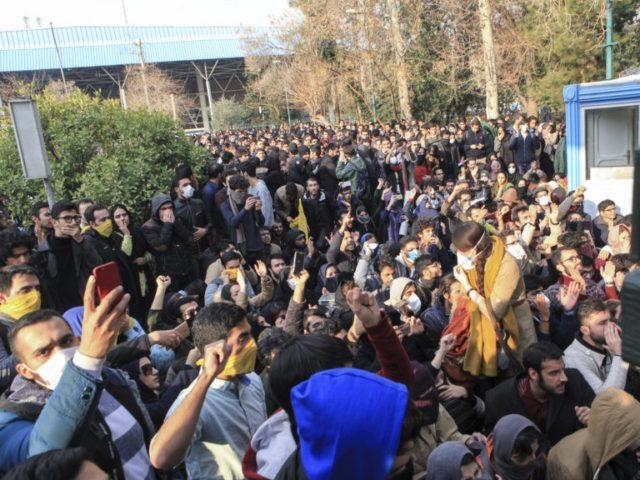TEL AVIV — There are no signs of external involvement in the protests sweeping across Iran, an Arab intelligence official told Breitbart Jerusalem.
The official further said that the initial working assumption among the region’s intelligence agencies is that the protests have not yet escalated to the point of potentially bringing down the Iranian regime. However, he stated, “the continuation of the wave” could lead to a “change in Iranian priorities, and cause Iran to invest more resources internally and less in support to external organizations.”
He stated Iran’s Revolutionary Guard has been “getting ready as if this is a wave that could turn into a revolutionary wave that could envelope the entire country and threaten the regime. But at this stage, it doesn’t look like a scenario that will happen in the immediate future.”
“The working assumption is that this is an internal wave fueled by Iran’s external entanglement and its destructive influence on the Iranian economy,” the official stated.
“The scope of the protest is an indication of its potential to expand,” continued the official. “The resources being invested by the regime in an attempt to put down (the protests) also indicate that as far as the regime is concerned, the current protest has explosive potential, especially in light of Iranian involvement in countries throughout the region.”
According to the intelligence official “there is no evidence at the moment that Iran is recalculating its forces and actions in the region, especially in Syria and Yemen. But if this wave continues, the Iranian regime will have to make some difficult decisions. What resources should be invested in spreading the Iranian revolution abroad and in the countries of the region? And what resources must be invested in order to preserve the regime?”
The source noted the differences between the current protests and the 2009 mass demonstrations.
“In 2009, there were no strong calls among the Iranian people to stop the funding of Hezbollah, which is a Shi’ite organization. This time, the calls to stop wasting money in Syria and Gaza have been heard clearly in Tehran.”
“If this wave continues, a scenario in which the Iranian regime lightens its role in Syria for its own survival within Iran isn’t difficult to imagine.”
Another difference between the current protests and the 2009 demonstrations seems to be the strong U.S. leadership in support of the protesters. Indeed, unlike his predecessor, former President Barack Obama, President Donald Trump quickly stood up for Iranian citizens protesting the Iranian regime.
The 2009 protests were launched on June 14 of that year, one day after President Mahmoud Ahmadinejad purportedly won reelection in a landslide victory amid widespread allegations of voting irregularities and violations. Obama was silent the first day of the anti-regime protests.
One day later, when Iran citizens held the largest anti-regime protest since the country’s 1979 revolution, Obama finally gave a muted response, saying that it was “up to Iranians to make decisions about who Iran’s leaders will be” and that “we respect Iranian sovereignty and want to avoid the United States being the issue inside of Iran.” Obama followed that up with a statement that he was “deeply troubled by the violence that [he had] been seeing on television,” but he fell short of strongly condemning Iran’s terror-supporting government.
Obama waited eight days to make another comment following an escalation in the protests, some of which resulted in violence against the pro-democracy protesters. “The United States and the international community have been appalled and outraged by the threats, beatings and imprisonments of the last few days,” he said. Obama made those comments following calls from lawmakers, including future Vice President Mike Pence, then a Republican congressman, for a stronger response.
Aaron Klein is Breitbart’s Jerusalem bureau chief and senior investigative reporter. He is a New York Times bestselling author and hosts the popular weekend talk radio program, “Aaron Klein Investigative Radio.” Follow him on Twitter @AaronKleinShow. Follow him on Facebook.

COMMENTS
Please let us know if you're having issues with commenting.